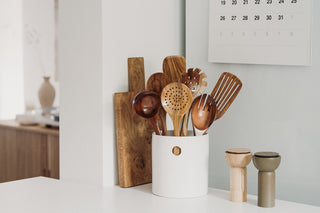In the modern kitchen, it’s easy to overlook the timeless charm that wooden kitchen utensils bring. Whilst plastic and silicone alternatives have gained popularity in recent years, wooden utensils are making a comeback in the kitchen, particularly as consumers consider the longevity of their appliances and utensils. In this article, we outline the common reasons why wooden utensils trump silicone / plastic. We will also covering some commonly asked questions.
1. Aesthetic Feel
Wooden kitchen utensils add a touch of natural beauty to any kitchen. The rich wooden grains and warm tones create a homely aesthetic which silicone struggles to replicate. Their natural properties also ensure that they are harder-wearing than their plastic counterparts which are prone to warp over time or under high heat.
2. Eco-Friendly Choice
A compelling choice to choose wooden utensils over silicone is their eco-friendly nature. Consumers are increasingly seeking alternatives that minimise their impact on the planet. We source wooden utensils from renewable sources across the world.
Manufacturers make silicone utensils from fossil fuels, and disposing of and recycling them is difficult. Choosing wooden utensils is a small yet meaningful step towards a more eco-conscious kitchen.
3. Natural Anti-bacterial Properties
Wood possesses natural anti-bacterial properties that make it an excellent choice for kitchen utensils. Some types of wood have natural anti-bacterial properties that prevent bacteria from growing on utensils. This can be particularly beneficial in a kitchen environment where cleanliness is of utmost importance.
4. Gentle on Cookware
Wooden utensils are gentle on cookware, especially non-stick surfaces. Unlike metal utensils that can scratch and damage the coating on non-stick pans, wooden utensils are soft and less likely to cause abrasions. This makes them a preferred choice for those who want to extend the lifespan of their cookware while maintaining its optimal performance.
5. Heat Resistant
Wooden utensils have natural heat resistance, allowing them to withstand high temperatures without melting or warping. You can use them for different cooking techniques, like stirring soups or flipping pancakes on a hot griddle. Plastic utensils can melt in high heat, while silicone utensils may change shape or become less strong over time.
Common Questions
Are wooden cooking utensils safe?
Wooden utensils are safer than plastic/silicone utensils as they don't contaminate food with chemicals. These anti-bacterial agents make wooden utensil sets a much better option than its cheaper counterparts.
Can you put wooden utensils in the dishwasher?
We would advise against doing so, given the harsh usage of water and temperatures in the dishwasher which may dry out the wood. We would recommend gently hand washing and drying these after use. To keep them looking fresh year after year, it is worth purchasing some food grade wood oil.
Do wooden kitchen utensils scratch pans?
As the key reason why people like having silicone utensils, wooden utensils do not damage pots and pans where used sensibly, unlike with metal utensils which scratch pots and pans far too often.


